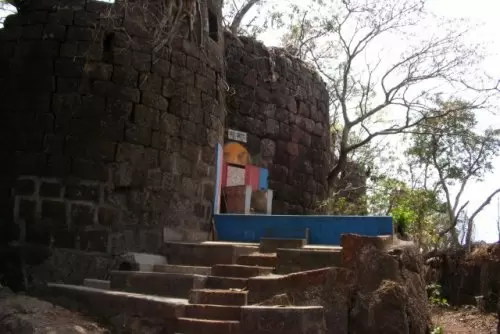RTI activist stops sale of 18th century Maratha sea fort
03-September-2016
Vol 7 | Issue 36
The single-minded pursuit by an RTI activist led to an expose and finally prevented the sale to a private party of a historical sea fort in Maharashtra, constructed in the early 1700s.
The Yashwantgad Fort, now in dire straits, was once an imposing edifice acting in the long line of coastal defences, standing at the entrance of Rajapur Creek in Ratnagiri district.
 |
|
The Yashwantgad Fort was constructed in the early 1700s at the entrance of the Rajapur Creek of the Arabian Sea on one side (Photo: IANS)
|
Sometime in early 2012, the owners of the 3.16-hectare land on which the fort stood, toyed with the idea of a sale which finally materialised in the form of an agreement on October 17 the same year.
RTI activist Samir V. Shirvadkar got a whiff of the sale of the historic property and decided to pursue its details through an RTI plea on August 23, 2013.
"I was shocked to learn that the once-magnificent fort had been sold for a paltry Rs 3.50 million and even the name change documents (7/12 extract) had been prepared in the name of the buyers," said Shirvadkar.
He filed another RTI plea the next month and secured the copies of the agreement, the sale deed and other relevant documents pertaining to the sale.
"It was sold by the current owners -- Vishwanath R. Patki -- to a couple -- Arvind T. Parkar and his wife Aneeta. The name change documents prepared by the revenue department also confirmed the sale," said Shirvadkar.
"The current owner's family had been given the land and the fort as a 'gift' by the erstwhile British government in the late 1800s, for services rendered. But by then the fort had already outlived its utility and strategic value so there was no maintenance or upkeep of any kind," said B.V. Kulkarni, Deputy Director, Directorate of Archaeology & Museums, Maharashtra.
"Over the years, the owners continued to live, work or farm there as the condition of the fort continued to worsen since it was not declared either as a monument of national or state importance. Now it is in our control and we shall prepare a long-term conservation plan which will eventually make it a tourist attraction," Kulkarni explained.
On the sale completed four years ago, the official said it does not affect the status of the fort as it is under the control of the government now and the owners cannot make any changes or alterations to the existing structure.
The Yashwantgad Fort served as an island fortification and was constructed in the early 1700s, at the entrance of the Rajapur Creek of the Arabian Sea on one side.
On the other three sides, it was protected by a ditch which served as a kind of moat, but it virtually disappeared over the years.
The fourth sea-facing side has a long continuous wall with 16 bastions and its main entrance was on the eastern side, though most of it is in ruins now due to centuries of neglect.
A British ship, HMS Outram had sank near the fort on January 1, 1817, after which the then government constructed a lighthouse at nearby Jaitapur.
Shirvadkar said the fort is now safely in government custody after a government resolution on June 24, 2016 and a gazette notification on August 29, declaring the ancient Yashwantgad Fort as a 'Protected Monument' under the Maharashtra Ancient Monuments and Archaeological Sites and Remains Act, 1960.
Holding great importance in Maratha naval history, the fort was mentioned in a treaty signed by the Maratha Admiral (Sarkhel) Kanhoji Angre and Chhatrapati Shahu Maharaj in Satara in 1713.
Earlier in 1707, Queen Tarabai Bhonsle, the daughter-in-law of Chhatrapati Shivaji who founded the Maratha empire, had appointed Angre as the Admiral and protector of the entire coastal area from Mumbai to Sawantwadi.
During that period, Angre constructed several sea forts, and the Yashwantgad Fort was built between 1707-1713 with huge dressed stones in dry masonry type.
The Yashwantgad Fort is built on two levels -- the Lower Fort, which is the larger one with its base touching the creek and a fresh water well inside, and the Upper Fort, which is smaller and on a hillock to keep watch on maritime activities in the surrounding waters.
With 16 bastions and three entrances, "this fort has a great importance in Maratha naval History", said the government notification earlier this week. - IANS















